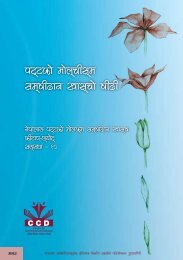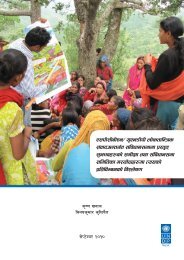English - Support to Participatory Constitution Building in Nepal ...
English - Support to Participatory Constitution Building in Nepal ...
English - Support to Participatory Constitution Building in Nepal ...
Create successful ePaper yourself
Turn your PDF publications into a flip-book with our unique Google optimized e-Paper software.
Post-conflict state build<strong>in</strong>gOthers have sought <strong>to</strong> acknowledge this imperial overstretch and permeatethe conceptual framework for peace build<strong>in</strong>g and state build<strong>in</strong>g with lessdemand<strong>in</strong>g aims. Krause and Jutersonke (2005, p 448) rightly assert that"Post-conflict operations are not m<strong>in</strong>or '<strong>in</strong>sertions' of another ac<strong>to</strong>r <strong>in</strong><strong>to</strong> acomplicated field of forces, but represent major breaks <strong>in</strong> state formation,often attempt<strong>in</strong>g <strong>to</strong> redistribute political, economic or social power andreshape the <strong>in</strong>stitutional terra<strong>in</strong> on which political competition occurs."While Krause and Jutersonke (2005) address some of the defects ofpresent approaches <strong>to</strong> post-conflict peace build<strong>in</strong>g, they cont<strong>in</strong>ue <strong>to</strong>adopt a 's<strong>in</strong>gle sovereign perspective' which assumes the <strong>in</strong>dividuality ofthe state and fails <strong>to</strong> capture how <strong>in</strong>ternational strategies are subverted,appropriated and resisted 'on the ground'. Any attempt <strong>to</strong> reconstitute as<strong>in</strong>gle sovereign and <strong>in</strong>scribe a s<strong>in</strong>gle path <strong>to</strong> development is at best futileand at worst takes the form of collusion with re-emerg<strong>in</strong>g structures ofdom<strong>in</strong>ation. This is but because of its model of a s<strong>in</strong>gle sovereign govern<strong>in</strong>ga bounded terri<strong>to</strong>rial unit (Heathershaw 2008). A better approach allowsus <strong>to</strong> explore empirically and <strong>in</strong>terpretatively the multiplicity of authorities(and spaces) that exist across and between given terri<strong>to</strong>ries. In short, wemust acknowledge the multiplicity of sovereigns and spaces.Question<strong>in</strong>g bounded terri<strong>to</strong>riality under a s<strong>in</strong>gle sovereignty is not thesame as deny<strong>in</strong>g the importance of terri<strong>to</strong>ry which we understand as a“physical and geographical area which ac<strong>to</strong>rs seek <strong>to</strong> control throughacts of defend<strong>in</strong>g, exclud<strong>in</strong>g, or <strong>in</strong>clud<strong>in</strong>g” (Cox 2002, pp 1-2). Thiss<strong>in</strong>gle sovereign perspective has captured the imag<strong>in</strong>ation of scholars,practitioners and critics of state build<strong>in</strong>g.'Post-conflict' is, of course, a mislead<strong>in</strong>g term. Gerd Junne and WillemijnVerkoren understand it as 'shorthand for conflict situations, <strong>in</strong> which openwarfare has come <strong>to</strong> an end' (Junne and Verkoren 2005, p 1). From this, itshould be em<strong>in</strong>ently clear that a 'post-conflict' society will have no shortageof conflicts or violence. It just means that these conflicts and violence arebe<strong>in</strong>g addressed <strong>in</strong> new modalities of <strong>in</strong>ternationalised governance. Theambiguousness of these situations has variously been described as 'nopeace, no war' (Richards 2005) or 'no war, no peace' (MacG<strong>in</strong>ty 2006).Such descrip<strong>to</strong>rs aptly highlight the difficulties of categoris<strong>in</strong>g this state ofaffairs. They also challenge the notion that post-conflict countries are <strong>in</strong> astage of transition between war and peace.Of course, the idea of a clean, unidirectional transition has already beendemolished by research show<strong>in</strong>g that the risk of war is substantially6


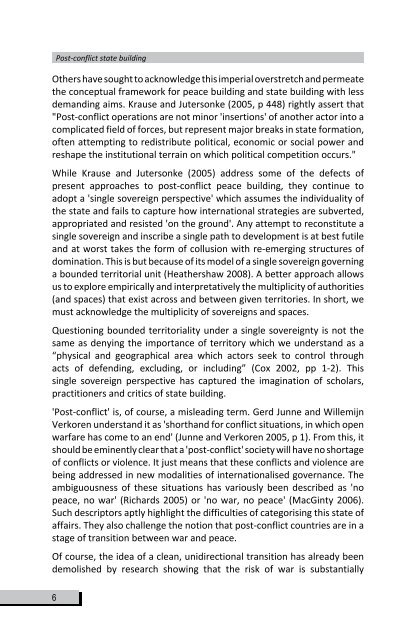

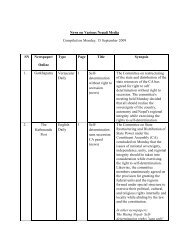
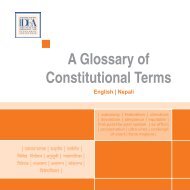
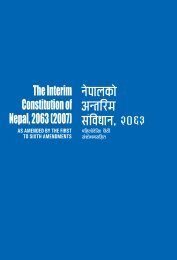
![g]k fnsf blntx? / gofF ;+l jwfg](https://img.yumpu.com/49483602/1/184x260/gk-fnsf-blntx-goff-l-jwfg.jpg?quality=85)
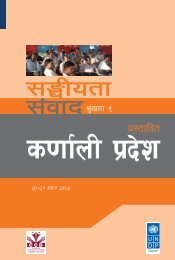
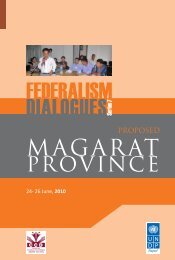
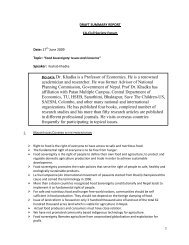
![+ljwfg;ef, /fHosf]k'g](https://img.yumpu.com/41604075/1/184x260/-ljwfgef-fhosfkg.jpg?quality=85)
